In Part 1 of our feature on slamless number ones we closely analyzed the years in which players reached No.1 ranking without winning a Grand Slam title and the five such players are the likes of Kim Clijsters, Amelie Mauresmo, Jelena Jankovic, Dinara Safina and Caroline Wozniacki (the first two won Grand Slam titles later in their careers). This Part 2 will focus on Martina Hingis and Lindsay Davenport – players who had years in their careers that they finished on top of the rankings without claiming a single Grand Slam title during that season – so they could theoretically be called slamless No.1s, even though they had won Grand Slams in the previous years, because in some years they were ranked No.1 they had no majors won. If these two analyses don’t stop all the fuss about the recent “shameful” slamless No.1s I don’t know what will! 🙂 Omair, bring on the numbers!
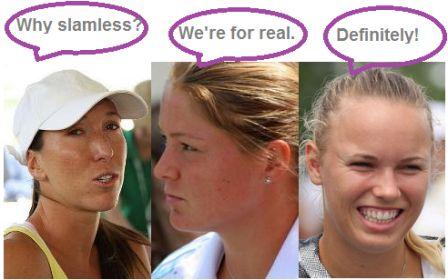
We have talked a lot about the spot being held by Caroline Wozniacki, Dinara Safina and Jelena Jankovic and discussed about whether their reign at the top was (is, in case of Wozinacki) fair or not. How did they end up being at the top of rankings without winning a major first? We did not appreciate their consistency throughout the year, tournament in, tournament out, what we did was only criticize them about being the slamless No.1s. I guess that’s enough of it, let’s move on to something I wanted to share with you guys. The other day I was going through the Tennis.com forums and there I saw that during the past 11 years, i.e. from the beginning of the 20th century, seven times a player has ended the year as No.1 and she did not win a single Grand Slam during the year. Here is the list of year-end No.1 players from 2000 onwards.
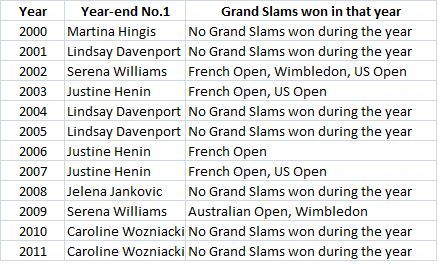
Martina Hingis, though she had won Grand Slams before 2000, did not end up winning a single major in 2000 and despite that she ended the year as world No.1. Lindsay Davenport had also won Grand Slams before 2001 but she did not win a single major in 2001, 2004 and 2005 and despite that she ended the years as No.1.
These two players did clinch the top spot without winning a major during that year, yet they have never been criticized for this achievement like Jelena Jankovic, Dinara Safina and Caroline Wozniacki. Some people argue that they did not win a major during that year but they had won it before that year, which to me is not a very strong logic. I think that these two players were not criticized because by winning a Grand Slam these two players had demonstrated their ability to win majors and hence put the critics to the silent mode.
In our Part 1 we had focused on the years of Clijsters, Mauresmo, Jankovic, Safina and Wozniacki, let’s now have a look at how well Hingis and Davenport performed in the years they earned the top spot without winning a major. We won’t include the stats of slamless year-end No.1s Jankovic and Wozniacki because we had already included them in our Part 1. Hope you people enjoy it 🙂
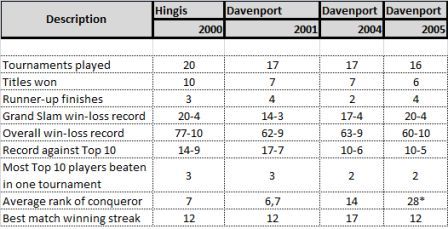
Hingis never lost before the quarterfinal stage of all the 20 tournaments she played and on top of that, she was only beaten once by a player ranked outside the Top 10. Davenport did not play French Open in 2001, despite that she ended up as world No.1, with a margin of just 10 points from Jennifer Capriati who had won the Australian Open and French Open that year!
* The average rank of conqueror is low due to the fact that both Henin and Clijsters had not played much during 2004 and had low rankings, Clijsters was ranked 133 when she defeated Davenport at Indian Wells and Henin was ranked 43 when she defeated Davenport in Charleston.
PERFORMANCE AT GRAND SLAMS
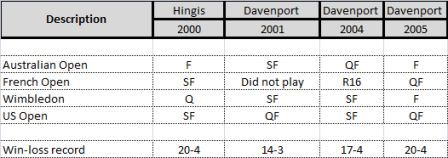
As you can see, in 2001 and 2004 Davenport reached two Grand Slam semifinals, just like Wozniacki in 2011.
LOSSES AND TITLES OF HINGIS AND DAVENPORT IN THE YEARS THEY ENDED NO.1 WITHOUT WINNING A GRAND SLAM
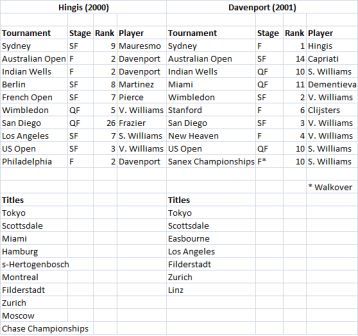
All these tables, numbers, stats and comparisons show us a few things:
- You don’t have to win a Grand Slam to be world No. 1;
- You can’t end up playing half year and finish the year at top;
- You have to play consistently throughout the year to be able to grab the top spot;
- Grand Slams alone are not the true measure of being the top player in the world.
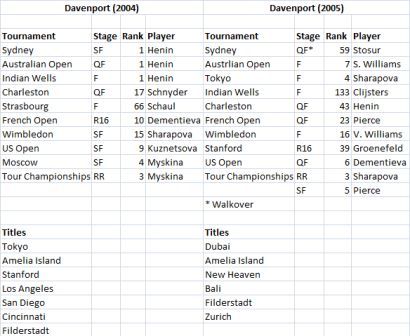
Now that you have gone through all the details, what do you think of these top players? Do you agree that we should stop calling Jankovic, Safina and Wozniacki slamless No.1s and simply start referring to them as (real) No.1s? I definitely think so.
For first-time readers of Women’s Tennis Blog and Omair’s stats, do check out the revealing previous analyses:
- Part 1: Comparison of the five slamless WTA No.1s and the origin of the phenomenon
- Comparative analysis of Top 10 players and their performance at big tournaments in 2011
- Part 1: Top 10 players in 2011 – how they scored against fellow big opponents
- Part 2: Top 10 players in 2011 – what do their losses suggest?


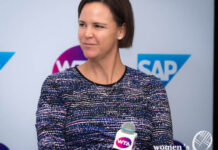

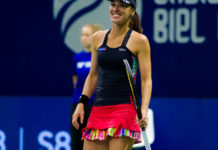

I disagree. Comparing Hingis/Davenport to the others is a flawed argument. The clear difference is that both Hingis and Davenport had won multiple slams prior. If you win a slam and are not #1 and than years later become #1 does that make you a slamless #1? No. Calling Hingis/Davenport slamless #1’s is ridiculous because they were not slamless. When Jankovic/Safina/Wozniacki win a slam, then and only then will I stop calling them slamless #1’s.
The 4 GS as well as the regular Tour events make up the schedule of the WTA. The GS define your career. You cannot get into the HoF without at least winning a Major and holding the No. 1 rank, either in singles or doubles. That being said, it does not matter how consistent you are or how well you represent your sport, if you cannot at some point win one of the 4 biggest titles that are on the line during the year, one of the 4 biggest titles that define the season then how can you say that you are the best.
In every other sport, there is an ultimate trophy or competition that defines your career or defines who is the best player. The NBA, NFL, MLB and even NASCAR and Golf have their majors. These are the tournaments that athletes train for. It is therefore unacceptable that these women who claim the top ranking are not able to clinch one of the 4 prizes that define their sport.
Finally, it is ridiculous that you should actually compare Davenport and Hingis to these 3 women. The careers of Hingis and Davenport are Hall of Fame worthy. I cannot even begin to see the justification for even claiming that they were allegedly Slamless No. 1 because they were No. 1 after they had stopped winning Majors. You cannot be serious.
Consistency is admirable but that consistency should also make itself be felt at your Tour’s biggest events, i.e. the Majors.
@ Tennis Ace
First things first, I agree with you about the importance of winning a grand slam and entering the Hall of Fame, of course fans will only remember you if at any point in your career you have won that elusive title. Yes, there are trophies in every sport that are considered to be pinnacle of success, but you can’t blame player for making it to the finals and loosing the championship match or making it to the last 4, if that player is making it to the last 4 at every tournament the player deserves something and shows that she is consistent enough to be at the top. The debate about this will no doubt go on forever. Furthermore, I too don’t like Wozniaki being at top, I would have loved to see Kvitova be at the top.
Now, I am really sorry that if you see it like I am comparing Hingis and Davenport with Wozniaki, Safina and Jankovic, I never said that in the analysis, what I compared was just a year of their careers with a year from these 3 player’s careers and I guess the years of these players have got something in common and are comparable in that neither won a grand slam in that year and yet managed to end the year at the top.
Furthermore, you mentioned that Hingis and Davenport had won slams in their career before those years, yes, I agree on this but does doing ood and wining slams previously mean that you can end every year of the sport at top no matter how bad you do? ( I am not saying that Davenport and Hingis played bad in those years) I don’t think so, every year is a new year, just like every class is a new class. You were a topper in previous class but does that mean you should be topper this year as well, no matter how less you score in your exams? I hope you are getting my point.
P.S I agree consistency should be exhibited at the majors as well.
Most fans are lucky if they can attend one major each year. I’m so lucky to live in the USA where we have other great tournaments including the 5th grand slam, Maimi, near my home. I also go to San Diego every year where fans can live where the players do at La Costa. It and Stanford are wonderful opportunities to see the WTA stars up close. Charleston is the best venue in the world and Cincinnati has great fans. Then there is Indian Wells which everyone loves.
My point is if the system doesn’t reward the players enough in these tournaments or if venues are dropped from the schedule, tennis wouldn’t be as popular as it is today. Players who are number one and didn’t win a major work harder, play more venues and are more consistent than the players who win majors the same year. Jankovic, Safina and Wozniacki are more famous and have better careers to date than several 21st century major winners.
Omair, thank you again for another great article. I’m definitely a big fan!!
A very well written article indeed. The point that needs to be emphasized is the consistency shown by the players throughout the year.
If we take the example of cricket, Australia is the number 1 ranked team in ODI’s according to the ICC rankings despite the fact that it hasn’t won the world cup. Just because it is consistently wins matches.
The argument that people give is that the player who hasn’t won a grand slam in their career does not have the ability to perform at the highest level. The other players mentioned in this article have displayed their abilities by winning grand slams so their number 1 position was justified even though they didn’t win a slam that year. This argument is an unending one and I guess neither side can win….so lets just leave it at that and get ready for a year 2012 full with excitement and amazing tennis!!
I still can’t agree with this stupid opinion “A number 1 is nothing without a Grand-Slam-Title”. A Grand-Slam-title just underlines their position but it isn’t everything.
A Grand-Slam is hard for everyone For a number one as for a number 325. There is much concurrence and there is only one girl able to win. This musn’t be the actual number one.
I think it’s more valuable to play constantly than winning a Grand-Slam. I mean what’s one Grand-Slam-Title when that’s all?! Two years later no one will remember. But if you play constantly and you are – for example – in the semi-finals or in the quarters for years, the people will remember your name.
Caro should just be herself and her succes at a Grand-Slam will develop until she gots the title. All that pressure which lies on her… That isn’t nice!
You guys have missed the entire point of the article and my comment. No one is saying that the regular Tour events are not important. Indeed, I would say that they are much more important than the ITF events. However, if you say that you are the best and you are the standard bearer for your sport, then it is incumbent on you to at least try and win one of the 4 biggest titles that define your career. No one cares that Stosur had a crappy year. All anyone will ever remember is that she won the USO beating Serena Williams to do it. Everyone will always remember Sharapova for her 2004 Wimbledon win over Serena. No one remembers who won Indian Wells last year or that there was a fantastic match played in Stuttgart. What people will remember is the classic match that was played in 2011 between Player A and Player B at whichever Major was around.
When your name is called for the Hall of Fame (and believe me every player wants to be in the Hall of Fame) they want their records to include, not only how many years they dominated the sport, but also how many of the big titles they were able to win. That is what makes you the best.
Tennis Ace, your point is 100% valid. If you need recognition by history…you simply gotta win grand slams. But the point raised by Omair here is that the players who haven’t yet won a grand slam and are numero uno, are so purely based on their performance during that particular year. If Caroline Wozniacki does not win any grand slams during her career…then she won’t be remembered by history as one of the greats of the game. Its as simple as that!
Talk about an apples to oranges comparison.
The book is out on Woz and she will continue to get demoralized by lower ranked players. And then we won’t have to talk about her being a slamless #1.. It will be more along the lines of, “Former #1 now ranked outside the top #20.”
Great article,Marija. I think all the ´criticism´ of slamless no.1s is ridiculous. It often times it comes from fans of players who won Grand Slam titles but never achieved a no.1 spot or lost it.
Winning a Grand slam is a big achievement however to be a no.1 is a lot more. It requires to play great tennis throughout all season, whereas Grand slam, however people try to put it, is only two-week period of play.
I think the bashers of slamless no.1s overlooks a lot of facts in assessing their performance and underestimate importance of other big tournaments.
Also, I think people should speak for themselves when expressing their opinion….
quote: No one cares Stosur had a crappy year…
Well,I care. I was disappointed by Li Na as well. For a winner of a GS title I would expect more,especially when it comes to Li Na.
@ Tennis Ace
I guess you have missed the whole point of the article. The article is not at all undermining the importance of the Grand-Slams, what the article is referring to is the fact that the players who earned the top spot did earn it through their play and consistency throughout the year rather than showing up at the slams and winning only the Slams. Slams no doubt define your career but to say that winning s Slam is a must to be a no. 1 is in itself ridiculous. I agree with the comments of Marine.
I agree with you that Stousr will be remembered for her US OPen or Schiavone and Li Na will be remembered for their French Opens but to say that Slam is a must to be a no.1 is not right. That’s what I think.
@ JohnyB and Marine
Thanks for the appreciation 🙂
@ Mirza Hasnain
Thanks a lot man for stopping by, going through it and commenting on it. It really means a lot to me man 🙂
Another great article, Omair 🙂
I agree that the criticism of “slamless No.1’s” has been way over the top. Admittedly, I think Grand Slams are the top prize in the game and what you will be remembered for, but the number one slot rewards consistency over the whole season, which is also important. It does annoy me how the likes of Serena and Clijsters just turn up when they want too unlike Wozniacki and Jankovic who are loyal to the tour all year round.
Nice article and comments here
I myself wasn’t agree with tag “slam is a must to be a no.1”
Marine, you do realise that you have contradicted yourself regarding your back to back posts? In the first one you take the position that regular Tour events are important and in the same breath you state that for a Grand Slam champion you were disappointed by Li’s performance.
Omair I do take your point in relation to the Slamless No. 1 debacle, but there is no way that you should be comparing the years that Hingis and Davenport held the No. 1 ranking without winning a Major against 3 women who have never even held a trophy and 2 of them who have only been to a Major final once each in their respective careers.
When Hingis and Davenport were winning Majors, they did so against incredible players. In addition if you look at the numbers that were posted you will see that these women’s win/loss records were incredible. They had a positive head to head against their compatriots at the time and like the stats say Hingis in particular did not lose to players ranked outside the top 10.
In any event this is a discussion that has no end. Just as how the Premier Mandatories and other events make up the Tour so too do the 4 GS. They are the pinnacle of our sport and these women should have tried harder to at least win one of them
James, Thanks a lot for the appreciation 🙂
Tennis Ace, yes you are right, this discussion has no end and I agree that to reach the pinnacle they no doubt have to strive harder and have to win the grand slams.
Tennis Ace, you aren’t really much of a fan of women’s tennis are you? Real fans care about who won Indain Wells last year and how well a certain German played in her home country. Only the general public who don’t really follow tennis knows only about grand slams. I guess saying the WTA tour is much more important than ITF events is just another way you put down the tour. Become a real fan and you would see why a young Wozniacki, number one for two straight years, has more of a chance to make the hall of fame than many others who have in recent years have won a slam.
TennisAce,
I don´t think I contradict myself. I was disappointed by Li Na in terms of her performance during the year. Yes, she won French Open but she could not sustain that winning form during the year which includes both GS and other tour events.
I was not contradicting myself, in fact, in those two posts I am referring to different things.
JohnyB – You have rightly put it down, I had wanted to say that but did not put it down, thanks for adding this 🙂
Being #1 is nice. But, that is somewhat similar to being a world record holder. World records come and go. Gold Medals are always remembered.
Same with tennis…
What people remember and what history judges greatness as are the Grand Slams.
I believe Wozniacki will win majors at some point in her career. She is young enough to have such accomplishments.
If you win just one major that isn’t enough to say you are great. But, multiple grand slams validates your career. Especially, if you can win at least 3 or more.
It’s players like Graf, Evert, Navratliova, Seles, Hingis, Williams sisters, etc…and great players from the distant past will always be remembered.
I for one hope Wozniacki can become a multi grand slam winner.
I admire Omair’s ability to make good comparisons, the only thing he wanted to point out was that some Grand Slam winners did actually have years without Grand Slam titles and finished No.1 and nobody questions the eligibility of the ranking system. I don’t see what’s so difficult to understand there.
Marija – I completely agree with you, but may be some fans get very emotional. That is how some fans are 🙂
Perhaps – just to make some change in the new year – the discussion could be about people winning slams without ever reaching the number 1 spot ? just for fun – I agree with you Marija
I completely accept if No 1 player do not win a slam during the year but I expect that (s)he prove a good play. My problem with Wozniacki is that she is not able to defeat top opponents on a regular basis. Her so-called “consistency” mainly means that she play a lot of tournaments preferably without tough opponents and collects points for not remarkable results.
There is a simple comparison with ATP. WTA gives relatively more points for smaller results then ATP. E.g., for slams W/F/SF/QF ATP gives 2000/1200/720/360 while WTA 2000/1400/900/500. If WTA would use the proportion of ATP, Wozniacki would not be No 1. This is probably the main reason why the discussions about “true No 1” is specific for WTA.
This a poor argument to make for several reasons. Firstly, it would’ve been erroneous to name Hingis or Davenport as “slamless #1’s” in those years they ended #1 as they both have won slams in their careers, hence, they weren’t “slamless #1’s”, regardless of the year they won them, obviously.
Secondly, I’m not sure what WTA you were following in early 00’s, but Hingis DID receive flack for not winning slams anymore yet being #1, but it wasn’t the cornerstone argument at the time in tennis because there was so much happening in women’s tennis and more stars AND ACTUAL SLAM WINNERS to focus on. With the main stars of WTA out with injury or whatever reason these last few years, the tennis media are desperate to have something to report that “slamless #1” became a continuing topic since Henin first retired and Jankovic became #1-it brings pageviews and discussion which equals more attention and money made for them. It’s also easier to comment on when you have an attention hungry current #1 who happens to be slamless: if she finds it so easy to win other tournaments and a slam is “just a two week period” then why is it so difficult to win one? Why is she performing so consistently in other tournaments yet so consistenly poorly in slams? I fail to see how that is such a flawed argument to make.
Thirdly, “…. I think that these two players were not criticized because by winning a Grand Slam these two players had demonstrated their ability to win majors and hence put the critics to the silent mode.”
Your quote is a popular defense people use when they criticise the slamless #1’s, what is so difficult to understand about this statement? How can you criticize a slam winner for never showing the ability and follow-through to win a major? That would be very silly, wouldn’t it?
Forthly, the only reason the “slamless #1” seems to be the only thing people talk about is because the current #1 is indeed slamless. If Azarenka were #1 right now we would still hear this argument from tennis media, some people would still question the ranking system, and question her eligibility to be called the top ranked player in the world. The argument is also “getting to #1 without winning a slam” not “ending the year as #1 without winning a slam”; if it were the latter, Safina would not be included in the list.
Finally, the years that both Hingis and Davenport gained the #1 ranking the ranking system WAS indeed in question in the media and it WAS realised that even though they did not win slams in those years, they consistently won the most titles AND made the second week of slams, which would OVERALL give them more points over the field (they were also criticised as chockers in slams). Also, in all of those years the top ranking was back-and-forth between several players and was 85% up for grabs with players losing points from previous year and others gaining new points. With the exception of Safina, the slamless #1’s have yet to barely MAKE a slam final while ranked “as the best player in the world”. Again, if I were a journalist I would make this argument as it is a new phenomenon indicative to the current generation of women’s tennis.
Well, I don’t think that winning any event is easy, not only a Grand slam. If it was why didn’t current slam winners just take it all? In fact, Kvitova is the only one who won a lot of events.
To be the best takes more than to be good over two weeks.